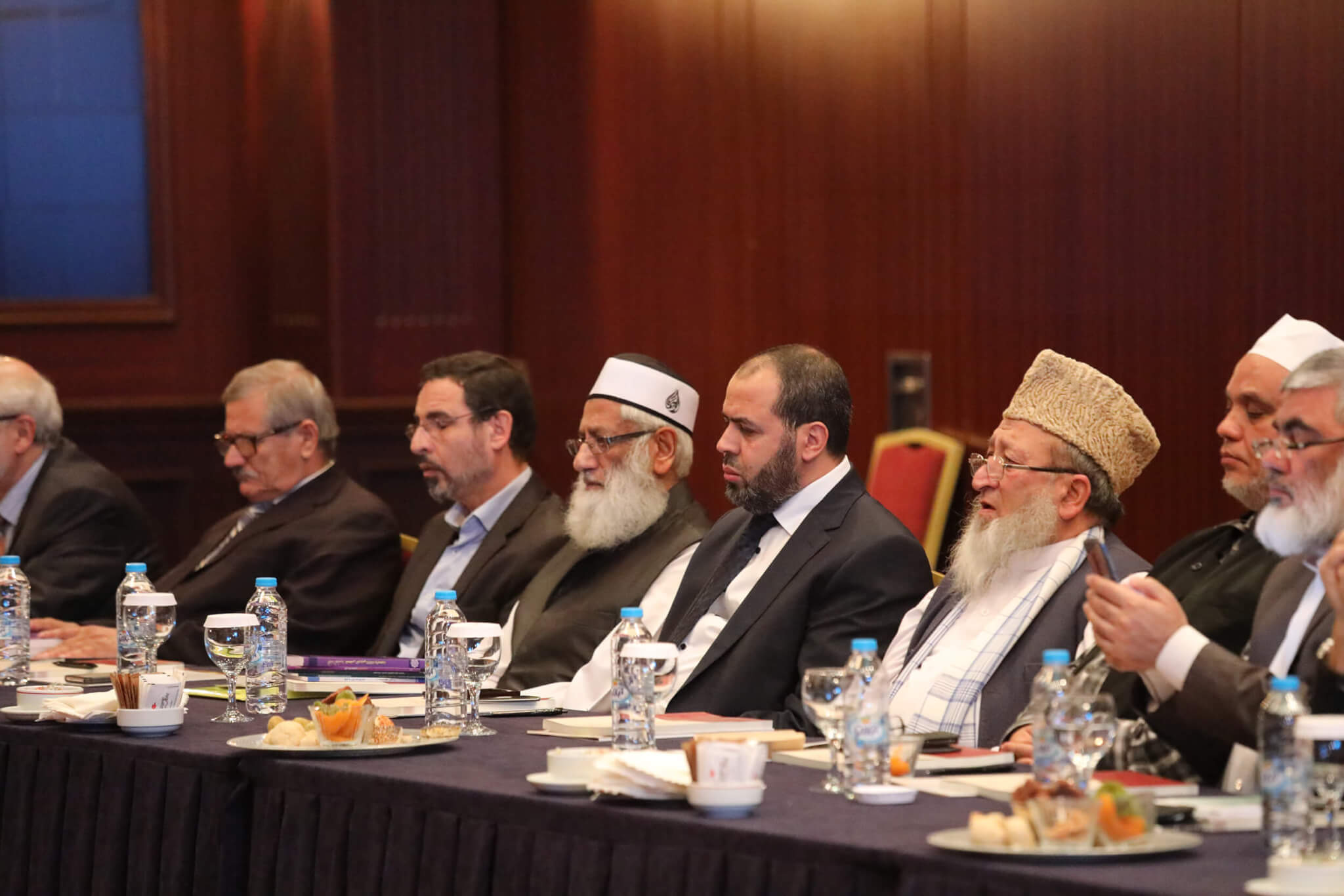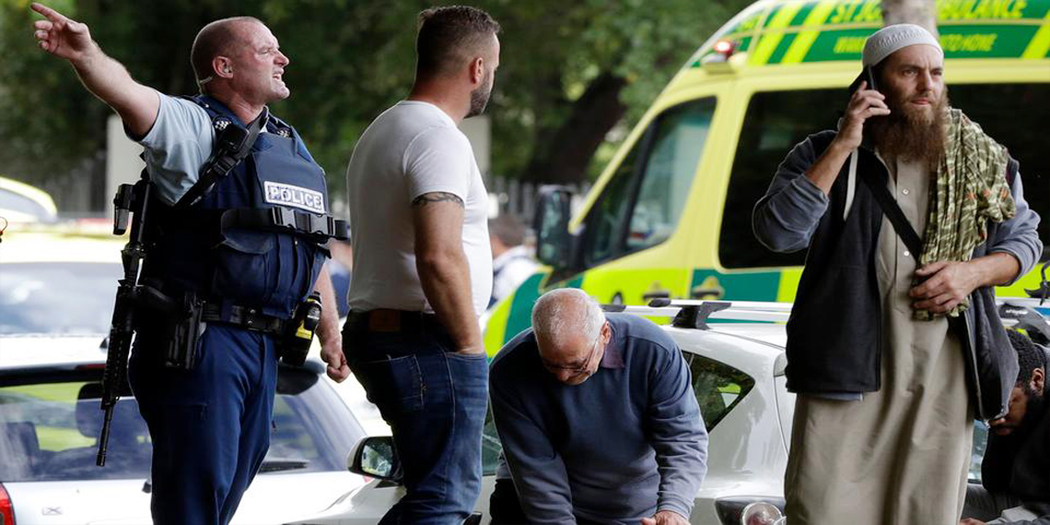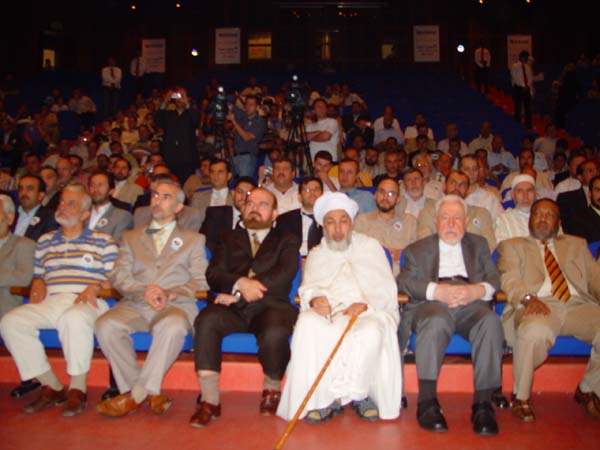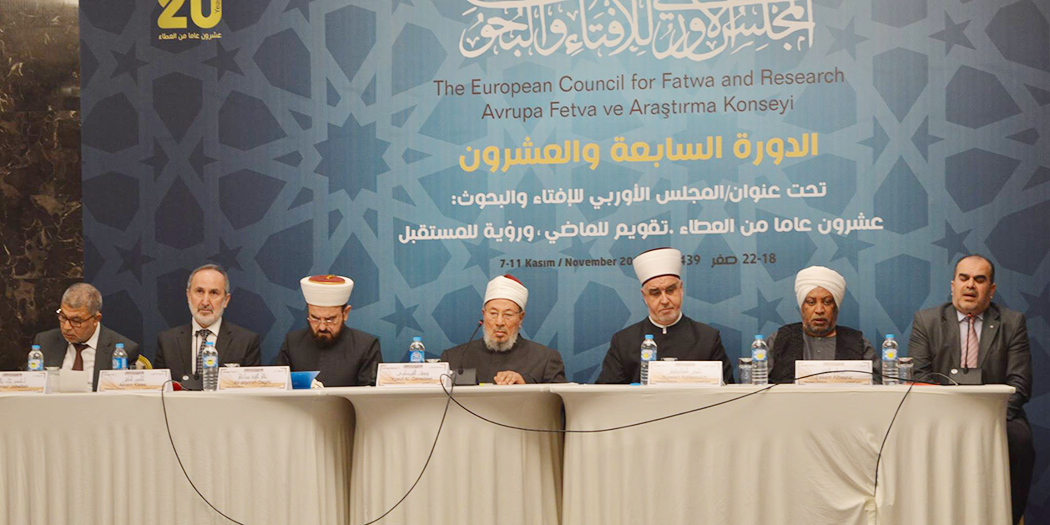The European Council for Fatwa and Research: Renewed leadership, renewed hopes

The European Council for Fatwa and Research: Renewed leadership, renewed hopes
Sh. Dr. Khaled Hanafy, ECFR Assistant Secretary

The inaugural meeting for the European Council for Fatwa and Research (ECFR) was held on 21 Dhul-Qaʿdah 1417AH/28 March 1997 in London. The ECFR is the first and the most important fatwa-reference and research institute in Europe. It a volunteer-led initiative, and its achievements—given its limited capacities—are significant. In the two decades since its foundation, the ECFR has made significant contributions to Islamic jurisprudence and to the lives of European Muslims. Over this period, it has produced several important scholarly contributions, many of which have shaped and helped the European Muslim community to live in conformity with their Islamic values in non-Islamic environments.
By the grace of Allah alone, the ECFR has also become a point of reference for other European academic and civil organisations, and its scholarly output has generated considerable interest from researchers and students at universities and scholarly institutions both in Europe and internationally. The research and efforts of the ECFR have resulted in a renewal-oriented juristic movement, which has reverberated and has influenced other juristic ECFRs. ʿAllama Yusuf al-Qaradawi was the founder and first head of the ECFR despite his objections and request that the head ought to be a European resident. However, the attendees insisted on electing Imam al-Qaradawi due to his depth of knowledge, his position and rank/popularity among scholars and general Muslim laity.
The ECFR consists of a number of jurists and researchers, the majority of whom live in Europe. The few ECFR members living outside Europe have close connections to the European Islamic culture and are familiar with the nature of juristic questions arising from Muslims living there. The scholars who live outside Europe have also had a major role in promoting the message of the ECFR and gaining the trust of Muslims across the world. These include some of the leading authorities in jurisprudence and of fatwa in the Muslim and Arab world, such as Sh. Dr. ʿAli al-Qaradaghi, Sh. Dr. Abdussattar Abu Ghudda, Sh. Dr. ʿUjayl al-Nashami, Sh. Dr. Hussein Hamid Hassan and other specialists, scholars, and experts. At the most recent ECFR meeting, held in Istanbul on 9 November 2018, a new leadership for the ECFR was elected. Who are these ECFR members and what does this mean for the future direction of ECFR?
The Newly-Elected President/Head of the ECFR
Sh. Dr. ʿAbdullah al-Judaiʿ was elected head of the ECFR, succeeding ʿAllama Yusuf al-Qaradawi. Al-Judaiʿ was born in Iraq in 1959 and has lived in Britain since 1993. He is a British citizen and earned a doctorate in Islamic Economics from the University of Wales Trinity Saint David, with a thesis titled: “A Critical Analysis of Contemporary Islamic Jurisprudence on Banking Interest” (2011). His MA was in Islamic Studies from Lampeter University (2006). He has over 70 publications, books, research papers, and edited works. Furthermore, he supervised and was head of the Shariʿah department in charge of the first ever digital hadith software (The Hadith Encyclopedia—Mawsūʾat al-Hadith al-Sharif), produced by Sakhr Software.
Sh. al-Judaiʿ is renowned for his expertise in hadith and jurisprudence, to the extent that his own Sheikh, Yusuf al-Qaradawi said of him: “He is more knowledgeable in jurisprudence and hadith than ourselves.” In a similar vein and decades earlier, the Muhaddith Sh. Muhammad Nasir al-Din al-Albani—may Allah have mercy on him—had also once remarked about al-Judai’s hadith expertise and meticulous research abilities, when he said of al-Judaiʿs book, Aḥādīth Dhamm al-Ghināʾ wal-Maʿāzif fīl-Mizān: “This is a very good book, comprehensive in its survey of the ahadith and athār concerning the subject-matter, in a manner that I have not seen done before, while offering criticism and analysis of every single narration of them, in a fashion rarely seen even in earlier classical (mutaqadimūn) works [of hadith analysis], all while fully adhering to the principles of this noble science.” Similarly, the Sheikh and jurist Muhammad al-Salih bin ʿUthaymin—Allah have mercy on him—also praised him and recommended al-Judai’s al-ʿAqīda al-Salafiyya fī Kalām Rabbil-Bariyya and would himself distribute it among his students. On that note, I have known Sh. al-Judaiʾ personally and found that he has the traits and attitude of a true scholar. He is immensely modest by nature, prepared to learn even from his students, willing to listen and accept criticism from all sides, and is open to change his opinions when shown to be mistaken.
The President’s Deputies
Two deputies were elected: Dr Ahmad Jaballah, the Dean of the European Institute of Human Sciences (EIHS) in France—one of the most significant and successful educational institutions in Europe. Jaballah is a Tunisian who has lived in France since 1980 and has a Higher Certificate from the College of Usul al-Din, al-Zaytuna University, Tunisia, and both an MA and PhD from Sorbonne University, Paris. He is fluent in both Arabic and French, and is an expert in developing strategies to reinforce the Islamic narrative in Europe.
Sh. Dr. Suhaib Hasan is the General Secretary of the Islamic Shariah Council in London. Born in India in 1942, he has an MA and PhD from Birmingham University, and a Diploma from the Islamic University in Medina. He has written more than 30 papers in both Arabic and English and reviewed and revised Abdullah Yusuf Ali’s renowned translation of the Quran. He is also a member of the Assembly of Muslim Jurists of America (AJMA). He is proficient in Arabic, English, and Urdu.
The ECFRs Secretariat
Sh. Hussein Halawa was elected General Secretary for the ECFR. He is the head of the Imam’s Union of Ireland and a regular khatib at the Islamic Cultural Centre in Dublin. He graduated from al-Azhar University and has an MA and PhD from the University of Islamabad, Pakistan. He is a member of juristic councils in both the United States of America and India, and presents a weekly call-in fatwa programme for Al-Hiwar channel in London.
Why does this new leadership constitute a new direction for the ECFR?
This newly elected leadership represents a significant change in the ECFR’s history and is indicative that the ECFR has chosen representatives based on their skills and experiences, which are needed to meet the challenges faced by European Muslims. It also confirms that Imam al-Qaradawi is departing from the ECFR having handed over its legacy to a capable scholarly team, who will ensure the continuing success of the ECFR, if Allah wills. The reasons for such optimism lie in the fact that it is an exclusively European-based leadership; its scholarly cadre is impressive, of varying backgrounds and lines of expertise and because none of the elected leaders had aspired to their position. To elaborate:
Firstly, the leadership is European-based: Imam al-Qaradawi confirmed in his opening speech the centrality of European identity of the ECFR. The default rule is that all ECFR conventions are held in a European country and that its leadership ought to be European. Historically, this was not always possible and an exception was made. However, with the new leadership in place, the ECFR returns to its founding principle and becomes a purely European-led council. Anyone who surveys the leadership will notice that it is formed of people who have lived in Europe for an extensive period. This gives them the ability to better assess the situation and to continue administering the ECFR in accordance with the reality before them and focus on those challenges the Muslim community faces and how to deal with them.
Secondly, the calibre of the scholars: The entire leadership consists of scholars and academics who have earned the highest qualifications in Shariah sciences from established European and international universities.
Thirdly, the diversity of leadership: By this I mean they hail from varying ethnic and cultural backgrounds. In the current leadership body, we have scholars who reside in Britain, France, Germany, and Ireland, whilst having been born in Iraq, Tunisia, India, and Egypt respectively. They also vary in age and in their spoken language proficiencies (exempting Arabic), which assists in providing different perspectives on the work required.
Fourthly, none of the ECFR leadership coveted their position. Every single person who was elected to their position of responsibility excused themselves from it and desired that someone else take on the role and relieve them of the responsibility. Sh. al-Judaiʿ voted for Dr. Ahmad Jaballah as Head, while Dr. Jaballah announced, after the votes had been counted, that he had voted for al-Judaiʿ. Once he had been elected as President, al-Judaiʿ remarked—with great emotion, “I’d never imagined that one day I would be in this position and I would not have accepted it were it not for one of my brothers who had warned me of the consequences of refusing or trying to excuse myself.” In reply, Sh. Dr. ʿIsam al-Bashir, member of the ECFR and the well-known caller to Islam and jurist declared: “You have three rights upon us: To pray for you and your brothers; to assist and support you; and to offer our advice to you.” The fact that everyone feels the weight of responsibility, that none of them sought out or even desired the position they find themselves in, combined with their willingness to consult others—all of these are very promising and good reasons to feel optimistic about the future of the ECFR. These sentiments indicate that all the members care for the welfare of the ECFR and its message and also demonstrate that a spirit of cooperation, professionalism, and order, rather than egoism, are the broad attributes of the ECFR.
A revised jurisprudence, not a retracted one
The ECFR devoted most of the days of the convention to revising its previous decisions and fatwas, since its inception until the 27th session in order to determine their soundness and suitability to be released and widely disseminated. This undertaking does not mean that it had retracted its general approach; rather, it continues to clarify and respond to questions based on juristic ijtihād suited for European Muslims and that reflects the nature the particularities of their period, place, legal and customary matters, and all of this in accordance with the principles and fundamentals of ijtihād as established by the scholars of legal theory.
These exercises of revising and amending previously issued fatwas and decisions is a good practice (sunna) that the ECFR has established. In fact, it occurred to me while it was undergoing: if we are today revising some fatwas and decisions based on new exigencies and consequences that we had not considered at the time, or owing to a newly manifesting benefit (maslaha) that has emerged, while the interim period between the two—the original legal decision and the revision—is less than 20 years, then on what basis are some people insisting on legal opinions that were given centuries ago without bothering to revisit and reconsider matters?! Of course, and perhaps needless to say, the fact that a revision is being undertaken does not warrant in any way that the original Muftis were mistaken or, worse, that they were unqualified. However, the point here is that we undertake ijtihād that is suited to our time and place and they—those scholars—undertook ijtihād that was suited for their time and place, and any true renewal of jurisprudence can only occur by first comprehending vast Islamic legal corpus and confirming it beyond doubt as a fundamental source.
Two new projects initiated by the ECFR
The ECFR has promulgated two important projects:
The first is a smartphone application called ‘The European Muslim’s Fiqh Guide’. This is an app that covers all the fatwas and decisions made by the ECFR from its inception up to its 27th session. This is nearing completion and is currently undergoing revision with a view to launch soon if Allah wills. The first version will be in both English and Arabic, and the second or updated version will include several other European languages. The app will allow people to use it without requiring an internet access and will allow users to send questions directly to the ECFR. The app will have functions to search the fatwas and will be regularly updated with all the new ones, and includes a directory of the main mosques in all major European cities.
The second is the ECFR Research Committee. This is a very promising initiative that aims to gather and employ the emerging European youth scholarly cadre, both male and female, and to explore the possibility of cooperation with other educational and governmental bodies. The initiative will also aim to make better use of the media to spread awareness of the work and findings of the ECFR to the European Muslims, European Imams, and to the general European population.
The ECFR Research Committee also aids the ECFR’s broader aim to improve and bolster the translation department of the ECFR and to make it easier for the ECFR to utilise different technologies and means, such as surveys, etc. Altogether, these measures will enable practical and measurable contributions towards revising and renewing jurisprudence, not least by combining between the studies and skills set gained by these youth in European universities, and tying that to the Islamic legal heritage and furthermore by allowing these youth formal contact with the ECFR’s work, particularly in the realm of training and forming jurist representatives in accordance with a studied plan, and finally to minimise the scope for extremism via scholarship and in practice.
The ECFR, with its history and position, its output, and the well-established scholarly reputations of its members, causes the Muslims of Europe to have high expectations of it and responsibilities towards them and to the process of renewing jurisprudence and ijtihād more generally. May Allah protect and grant long life to the former President, the ʿAllama and Mujaddid Sh. Yusuf al-Qaradawi. May Allah reward him for all his contributions to the ECFR and to the Muslims of Europe. May Allah grant strength to the new president, Sh. Dr. ʿAbdullah al-Judaiʿ and continue to benefit and unite people through him. Allah is indeed All-Hearing, All-Answering.




